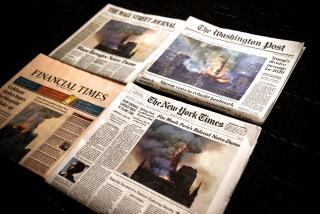SIMI VALLEY : Newspapermen Defend Their Approaches
- Share via
They are two newspapermen who epitomize what critics say is wrong with today’s journalism: Al Neuharth, the founder of USA Today with its short, quippy style of writing, and Iain Calder, editor of the sensationalist tabloid, National Enquirer.
But both men, speaking Tuesday at a conference at the Ronald Reagan Presidential Library near Simi Valley, say newspapers across America have followed their lead.
“(Critics) labeled us McPaper, the fast food of journalism,” Neuharth said. “But now most of them have stolen many of our McNuggets.”
Scrapping for an ever-shrinking number of readers and suffering from an image problem, newspapers face a questionable future--or at least the future of newspapers was being questioned at the daylong conference Tuesday.
Journalists and media critics hashed out the state of newspapers in America and the role newspapers play in the electronic “global village.”
Neuharth took an upbeat tone in his keynote address, saying that newspapers would have a future as long as editors realized that “they were in the information business not the newspaper business.”
His creation was criticized for its colorful graphics and short departmentalized stories targeted for different types of readers. The secret to its success, Neuharth said, was the same secret that will keep papers alive in the future: giving the readers what they want.
Experimental on-line newspapers that allow the readers to choose the kinds of stories they want to read could be the wave of the future, Neuharth said.
But that consumer-driven approach to news has led, some critics contend, to the “tabloidization” of the news. As the percentage of the population reading newspapers declines and people turn to television for their news, newspapers have turned to sometimes sensational stories or celebrity coverage to attract readers, critics said.
A panel at the conference titled “Tabloid Nation” looked at the increasingly blurry line between information and entertainment, news and commentary. Moderated by Marvin Kalb, veteran national correspondent for both CBS and NBC news, the panel included Calder.
Kalb argued against the thesis that tabloids and tabloid television were driving the news, but others on the panel said that, like it or not, the pressure from those outlets was hitting the mainstream media.
Calder said that such august publications as the New York Times had called the National Enquirer “the Bible of O.J. Simpson coverage.” The Enquirer, famed for breaking such stories as Gary Hart’s philandering by printing pictures of Hart with Donna Rice, could not be lumped together with other tabloids that print stories of UFOs at the White House and alien babies, Calder said.
But the influence of such borderline news stories is “insidious,” said Gerald Warren, assistant publisher of the San Diego Union-Tribune.
“We have a responsibility to be accurate and factual,” Warren said.
More to Read
Sign up for Essential California
The most important California stories and recommendations in your inbox every morning.
You may occasionally receive promotional content from the Los Angeles Times.













